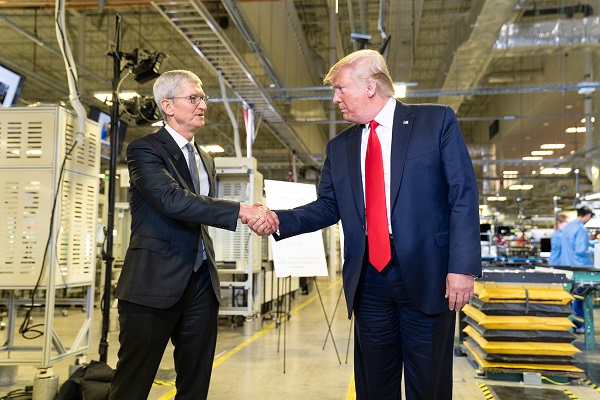Artificial Intelligence
Elon Musk is building the ‘most powerful Artificial Intelligence training cluster in the world’

News release from The Deep View
| Elon Musk’s xAI has ended talks with Oracle to rent more specialized Nvidia chips — in what could have been a $10 billion deal — according to The Information. |
| Musk is instead buying the chips himself, all to begin putting together his planned “gigafactory of compute.” |
| The details: Musk confirmed in a post on Twitter that xAI is now working to build the “gigafactory” internally. |
|
| xAI isn’t the only one trying to build a supercomputer; Microsoft and OpenAI, also according to The Information, have been working on plans for a $100 billion supercomputer nicknamed “Stargate.” |
| Why it matters: The industry is keen to pour more and more resources into the generation of abstractly more powerful AI models, and VC investments into AI companies, as we noted yesterday, are growing. |
| But at the same time, concerns about revenue and return on investment are growing as well, with a growing number of analysts gaining confidence in the idea that we are in a bubble of high costs and low returns, something that could be compounded by multi-billion-dollar supercomputers. |
Artificial Intelligence
Apple faces proposed class action over its lag in Apple Intelligence

News release from The Deep View
| Apple, already moving slowly out of the gate on generative AI, has been dealing with a number of roadblocks and mounting delays in its effort to bring a truly AI-enabled Siri to market. The problem, or, one of the problems, is that Apple used these same AI features to heavily promote its latest iPhone, which, as it says on its website, was “built for Apple Intelligence.” |
| Now, the tech giant has been accused of false advertising in a proposed class action lawsuit that argues that Apple’s “pervasive” marketing campaign was “built on a lie.” |
| The details: Apple has — if reluctantly — acknowledged delays on a more advanced Siri, pulling one of the ads that demonstrated the product and adding a disclaimer to its iPhone 16 product page that the feature is “in development and will be available with a future software update.” |
|
| Apple did not respond to a request for comment. |
| The lawsuit was first reported by Axios, and can be read here. |
| This all comes amid an executive shuffling that just took place over at Apple HQ, which put Vision Pro creator Mike Rockwell in charge of the Siri overhaul, according to Bloomberg. |
| Still, shares of Apple rallied to close the day up around 2%, though the stock is still down 12% for the year. |
Artificial Intelligence
Apple bets big on Trump economy with historic $500 billion U.S. investment

Diving Deeper:
Apple’s unprecedented $500 billion investment marks what the company calls “an extraordinary new chapter in the history of American innovation.” The tech giant plans to establish an advanced AI server manufacturing facility near Houston and significantly expand research and development across several key states, including Michigan, Texas, California, and Arizona.
Apple CEO Tim Cook highlighted the company’s confidence in the U.S. economy, stating, “We’re proud to build on our long-standing U.S. investments with this $500 billion commitment to our country’s future.” He noted that the expansion of Apple’s Advanced Manufacturing Fund and investments in cutting-edge technology will further solidify the company’s role in American innovation.
President Trump was quick to highlight Apple’s announcement as a testament to his administration’s economic policies. In a Truth Social post Monday morning, he wrote:
“APPLE HAS JUST ANNOUNCED A RECORD 500 BILLION DOLLAR INVESTMENT IN THE UNITED STATES OF AMERICA. THE REASON, FAITH IN WHAT WE ARE DOING, WITHOUT WHICH, THEY WOULDN’T BE INVESTING TEN CENTS. THANK YOU TIM COOK AND APPLE!!!”
Trump previously hinted at the investment during a White House meeting Friday, revealing that Cook had committed to investing “hundreds of billions of dollars” in the U.S. economy. “That’s what he told me. Now he has to do it,” Trump quipped.
Apple’s expansion will include 20,000 new jobs, with a strong focus on artificial intelligence, silicon engineering, and machine learning. The company also aims to support workforce development through training programs and partnerships with educational institutions.
With Apple’s announcement, the U.S. economy stands to benefit from a major influx of investment into high-tech manufacturing and innovation—further underscoring the tech industry’s continued growth under Trump’s economic agenda.
-

 International2 days ago
International2 days agoJD Vance was one of the last people to meet Pope Francis
-

 2025 Federal Election1 day ago
2025 Federal Election1 day agoOttawa Confirms China interfering with 2025 federal election: Beijing Seeks to Block Joe Tay’s Election
-

 COVID-191 day ago
COVID-191 day agoNearly Half of “COVID-19 Deaths” Were Not Due to COVID-19 – Scientific Reports Journal
-

 2025 Federal Election1 day ago
2025 Federal Election1 day agoHow Canada’s Mainstream Media Lost the Public Trust
-

 2025 Federal Election1 day ago
2025 Federal Election1 day agoBREAKING: THE FEDERAL BRIEF THAT SHOULD SINK CARNEY
-

 2025 Federal Election1 day ago
2025 Federal Election1 day agoReal Homes vs. Modular Shoeboxes: The Housing Battle Between Poilievre and Carney
-

 International14 hours ago
International14 hours agoNew York Times publishes chilling new justification for assisted suicide
-

 2025 Federal Election1 day ago
2025 Federal Election1 day agoPOLL: Canadians want spending cuts






